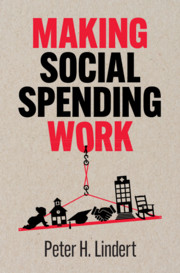
-
Select format
-
- Publisher:
- Cambridge University Press
- Publication date:
- 01 April 2021
- 08 April 2021
- ISBN:
- 9781108784467
- 9781108478168
- Dimensions:
- (228 x 152 mm)
- Weight & Pages:
- 0.76kg, 434 Pages
- Dimensions:
- Weight & Pages:
- Subjects:
- Economics, Macroeconomics, History, Economic History
You may already have access via personal or institutional login- Subjects:
- Economics, Macroeconomics, History, Economic History
Book description
How does social spending relate to economic growth and which countries have got this right and wrong? Peter Lindert examines the experience of countries across the globe to reveal what has worked, what needs changing, and who the winners and losers are under different systems. He traces the development of public education, health care, pensions, and welfare provision, and addresses key questions around intergenerational inequality and fiscal redistribution, the returns to investment in human capital, how to deal with an aging population, whether migration is a cost or a benefit, and how social spending differs in autocracies and democracies. The book shows that what we need to do above all is to invest more in the young from cradle to career, and shift the burden of paying for social insurance away from the workplace and to society as a whole.
Reviews
‘It's hard to think of anyone who has had such a profound effect on the way we think about political economy. This remarkable book gives us all more to chew over. Peter Lindert continues to set the agenda.'
James A. Robinson - co-author of Why Nations Fail
‘Surprise! There are free lunches. But they may be running out soon. Learn why they exist and threats on the horizon to the many benefits of generous social spending from Peter Lindert's informative and readable book.'
Claudia Goldin - co-author of The Race between Education and Technology
‘Why do we have government-financed social spending? Why did it emerge rather late in human history? What has it accomplished? These are some of the fundamental questions that Peter Lindert asks in his monumental Making Social Spending Work. Lindert's study of education, health care, old-age spending around the world could not have been more timely: these issues are again at the forefront of the political agenda.'
Branko Milanovic - author of Capitalism, Alone
‘A must read for anyone interested in promoting just and sustainable growth. With pristine clarity, Lindert explains why social spending has risen everywhere. Using history and solid empirical evidence he debunks myths about negative effects and proposes new policies to facilitate inclusive growth and design a new social contract.'
Nora Lustig - editor of Commitment to Equity Handbook
‘A magisterial examination of the historical, economic and political forces shaping the Welfare State, from its incipient beginnings in Fifteenth Century Europe to the rise of conditional cash transfers in Latin America in the 1990s. A must-read for anyone interested in rethinking the role of the State after the pandemic.'
Francisco H. G. Ferreira - co-author of Economic Mobility and the Rise of the Latin American Middle Class
Contents
Metrics
Altmetric attention score
Full text views
Full text views help Loading metrics...
Loading metrics...
* Views captured on Cambridge Core between #date#. This data will be updated every 24 hours.
Usage data cannot currently be displayed.
Accessibility standard: Unknown
Why this information is here
This section outlines the accessibility features of this content - including support for screen readers, full keyboard navigation and high-contrast display options. This may not be relevant for you.
Accessibility Information
Accessibility compliance for the PDF of this book is currently unknown and may be updated in the future.


